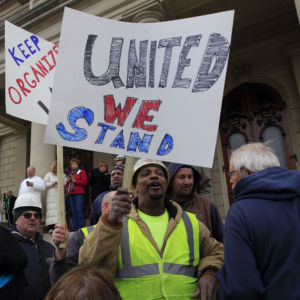A Kentucky circuit court reversed an earlier decision Friday that banned counties in the state from enacting their own right-to-work ordinances.
District Court Judge David Hale ruled in a union lawsuit Feb. 3 that counties could not enact right-to-work on their own. The policy outlaws mandatory union dues or fees as a condition of employment. The sixth circuit court reversed the decision because federal law governing the policy only discusses what states can do.
“The Unions contend the ordinance is unenforceable because it is preempted by the National Labor Relations Act,” the decision stated. “The court recognized that the NLRA expressly excepts from preemption such right-to-work protections under ‘State law,’ but held that the law of a State’s political subdivision is not ‘State law.'”
States typically decide whether to enact the policy making the county ordinances a new legal frontier. Warren became the first county in the entire country to enact right-to-work back in December 2014. About a dozen counties soon followed. Hardin County became the subject of the union lawsuit not long after.
“We congratulate the county officials in Kentucky who worked so hard and risked so much to expand the liberty and prosperity for their communities,” Center for Worker Freedom Executive Director Matt Patterson said in a statement. “And we congratulate all our coalition allies who defied the naysayers on both sides of the aisle.”
The United Auto Workers Local 3047 filed the lawsuit with the intent of making all the ordinances void. The lawsuit contested that only states had the authority under federal law to enact right-to-work. Judge Hale ruled against the county ordinances after almost six months of consideration.
“Right-to-work ordinances afford workers with the choices they deserve when it comes to joining unions,” Americans for Prosperity Kentucky Director Julia Crigler said in a statement. “Being a union member and paying dues should be a decision that is left up to the worker, not the powerful unions that push for compulsory membership.”
Americans for Prosperity was among several groups advocating for the localized push. It made a $50,000 grant last year to the legal defense fund ProtectMyPaycheck to help right-to-work counties fight against any lawsuits. Kentucky allows localities to enact their own economic ordinances so long as it doesn’t interfere with existing state law.
Local 3047 did not respond to a request for comment by InsideSources.

